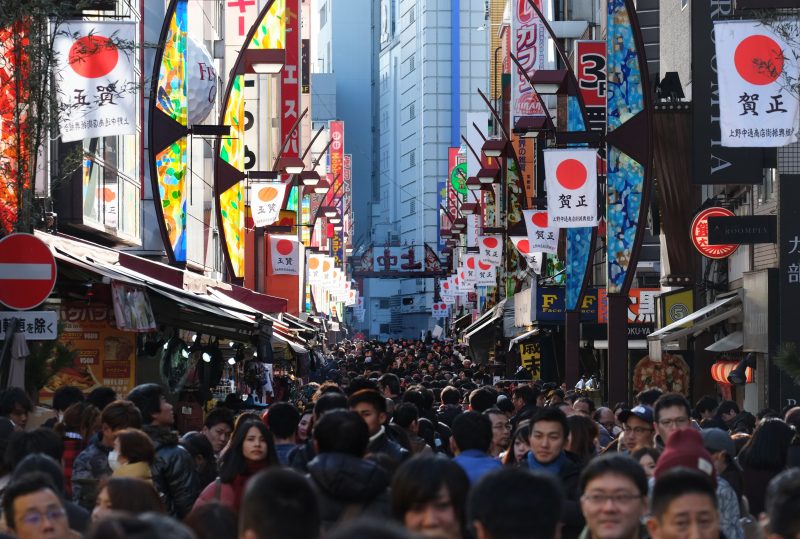Will he, won’t he? Speculation over Japan’s sales tax hike
There are worries that a hike in the sales tax could dampen consumption in the world’s third-biggest economy (Kazuhiro NOGI)
Tokyo (AFP) – After months of speculation that Japan’s government could postpone an impending sales tax hike to avoid damaging the economy, it appeared set to go ahead with the move thanks to stronger-than-expected growth data released Monday.
The data showed GDP expanded by 0.5 percent in the first quarter, and while the recovery was soft and economists expressed concern over weak consumption, the data is likely to boost the case for the sales tax to finally go ahead.
The consumption tax issue is huge politically in Japan and there had been suggestions that it could be postponed for a third time, with Prime Minister Shinzo Abe calling a snap election this summer.
Here are some key questions and answers about the tax, which is due to be raised from eight percent to 10 percent from October:
– What is it? –
The consumption tax is an eight-percent tax payable on goods and services at the point of sale.
Similar to VAT in many other countries, the Organisation for Economic Cooperation and Development (OECD) notes it is one of the lowest rates among the group’s 34 nations.
Abe has vowed to raise it to 10 percent but has already twice delayed taking the plunge for fear of hobbling consumption and the economy.
– Why hike the tax? –
After Japan’s tech-driven property and stock market bubble burst in the early 1990s, successive governments launched round after round of economic stimulus that swelled Japan’s debt mountain.
The nation’s debt-to-GDP ratio — a key indicator of financial health — stood at an eye-watering 226 percent in 2018, according to the OECD, which noted it was “the highest ever recorded” in the group.
For comparison, debt-to-GDP is 138 percent in the United States, 71 percent in Germany and 112 percent in Britain. The limit for members of the euro area is supposed to be 60 percent of GDP.
Most economists agree that hiking the tax is crucial for reducing this debt mountain.
Abe has also vowed to use the proceeds to fund free preschools and childcare in a bid to boost birth rates and the female workforce in the ageing and shrinking country.
– Why could it be postponed? –
Abe and his senior officials have insisted the hike will proceed as planned. The leader has said it would take a shock on the level of the Lehman Brothers collapse to derail it.
But in a research note published before Monday’s GDP data, Tobias Harris, an analyst at Teneo consultancy group, noted that Abe said a similar thing in 2016 and then, “after a feeble attempt to argue that such a shock could be imminent, he postponed the tax increase for a second time anyway”.
And after enjoying a long period of uninterrupted growth, the economy slammed into reverse at the end of last year.
A series of forward-looking indicators, notably a key government index, suggest that the economy may have entered a recession.
The last consumption tax hike in 2014 was widely blamed for sparking a recession and Abe is desperate to avoid a repeat.
Harris said: “If the escalation in the US-China trade war intensifies downward pressure on Japan’s economy, the prime minister could use the slowdown to justify delaying the tax hike again (blaming external factors).”
– What’s the political impact? –
With Abe enjoying high personal popularity ratings and political opposition next to non-existent, speculation is swirling that he could use a delay in the tax hike to call a snap general election.
“Having failed to achieve diplomatic breakthroughs with Russia or North Korea that might otherwise have justified a snap election, delaying the consumption tax is the best argument Abe can make for calling a general election,” said Harris.
The consumption tax is seen by many as a third-rail in Japanese politics and politicians avoid raising taxes if they can help it.
In April 1989, then-prime minister Noboru Takeshita ushered in Japan’s first-ever sales tax — at three percent — and was forced to resign two months later amid plunging popular support and a separate corruption scandal.
His successor then received a drubbing at the ballot box.
– What can soften the blow? –
Abe has promised a series of measures to mitigate the economic impact, including maintaining the rate at eight percent for food and non-alcoholic drinks.
In addition, consumers will be offered incentives if they pay using cashless methods, as Japan seeks to wean itself off paper money.
Bank of Japan Governor Haruhiko Kuroda has said he believes these measures will mean the tax hike has only a limited impact on the economy.
Disclaimer: Validity of the above story is for 7 Days from original date of publishing. Source: AFP.


